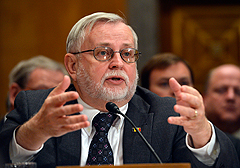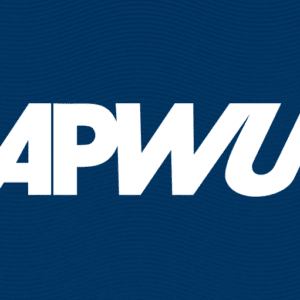February 13, 2013
Congress Must Act Now, Guffey Tells Senate Panel
“The crisis confronting the Postal Service is dire, but the demise of the USPS is not inevitable,” APWU President Cliff Guffey told a Senate panel on Feb. 13.

“Congress must end the mandate of the Postal Accountability and Enhancement Act (PAEA) that requires the USPS to pre-fund healthcare benefits for future retirees. This requirement, which ostensibly was implemented to protect taxpayers in the event the USPS ‘goes under,’ is instead drowning the agency in a sea of debt,” Guffey said in a written statement.
“Congress also must grant the Postal Service flexibility to increase rates. In addition to saddling the Postal Service with a $5.5 billion annual mandate that no other government agency or private company bears, the PAEA prohibits the USPS from raising postage rates above the rate of inflation. This flawed law imposes a major liability on the USPS, but prevents it from raising the revenue it needs to meet the obligation,” he noted.
More drastic cuts in service would be counterproductive, Guffey told the Committee on Homeland Security and Governmental Affairs. In 2012, the USPS closed approximately 50 mail processing facilities, and plans to close 100 more this year. The USPS has closed hundreds of post offices and reduced hours at thousands more. The Postal Service “is on the brink of cutting services in ways that will permanently damage the Postal Service by making its services less useful. This would be a tragic mistake, and it is unnecessary,” he said.
Privatization is the Wrong Direction
Guffey urged the Senators to reject calls for privatization of the Postal Service. “Privatization is wrong for the Postal Service and wrong for America,” he said.
According to a recent study by the PEW Center, one in five American adults do not use the internet. “Forty percent of American adults — nearly 100 million people — do not have broadband access. Senior citizens, adults with less than a high school education, and those living in low-income households are the least likely to have internet access,” Guffey said.
“Privatization will leave these customers by the side of the road. It also will result in sharp price increases. An examination of privatized posts in other countries demonstrates this clearly,” he said.
To meet the needs of those who haven’t joined the digital revolution and remain useful for those who have, legislators must free the Postal Service to develop new products and new sources of revenue, the union president said.
“America needs its Postal Service. Businesses rely on it, and customers depend on it.”
In a still weak economy, the USPS generated $65 billion worth of business in 2012, Guffey noted. “Private couriers will not serve all of America. They will serve only the markets that seem likely to generate a profit. Privatization would destroy the essence of our nation’s mail system, whose mission is to bind the nation together,” he said in written remarks.
“The time for action is now,” he concluded. “We will do whatever we can to help Congress and the Postal Service make these changes.”
Unusual Witnesses
The witness list was unusual in two respects: It included two members of the House Committee on Government Reform — Chairman Darrell Issa (R-CA) and Ranking Minority Member Elijah Cummings (D-MD). Both expressed optimism about postal reform and vowed to work together to make it happen.
The witness list also included R. Richard Geddes, Associate Professor at Cornell University, an ardent advocate of privatization. This is the first time in recent memory that a witness has expressly promoted privatization.
Other witnesses were:
- Postmaster General Patrick R. Donahoe
- Comptroller General Eugene L. Dodaro, Government Accountability Office
- Jeanette P. Dwyer, President of the National Rural Letter Carriers Association
- Robert J. Rapoza, President of the National Association of Postmasters of the U.S., and
- Joe Quadracci, President and CEO of Quad/Graphics, Inc.



